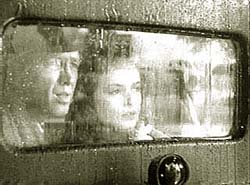After trying and failing to read Jumpha Lahiri's novel twice, the prose in which is direct and stylish, I was cheered to find that reviewers praised the movie. The fault of the novel lies with this reader. There's no accounting for taste.
This is a strange and wonderful movie. It should not work. But it does. It's Merchant Ivory meets Ang Lee (of The Ice Storm). The Namesake is Gogol Ganguli, son of Ashoke Ganguli and his wife Ashima. But his story pales in comparison to Ashima's, the story of a woman to whom things happen. "Strike one," calls the screenwriting line judge. The protagonist must act!
But Ashima's is the story of endurance and America is her gauntlet. Early on, she shrinks Ashoke's clothes when she takes it upon herself to do laundry without help the first day she's in the country. She learns to drive tentatively, and remains a lifelong nuisance on the road. And though their devotion is real, her children are strange, American creatures. Gogol, in particular, brings home a self-assured blond beauty who shows no sensitivity for the differences between her and him, and even less for his parents. These Ashima bears, not without comment, but without histrionics or depression.
The movie was once about Gogol and the mantle passed down to him by fathers and grandfathers and filliped by his father when he named him for the Russian novelist. "Was once," I say, because his drops to the background again and again. He comes of age sometimes clumsily, lurching from a happy-go-lucky love affair with brilliant, upper-class New York blonde to a marriage to a Bengali intellectual who will leave him for a French lover. He is always threading the needle of history with his own experience of Bengali-American family tradition, of Indians in America. The shadow of India is always looming behind him and bright, easy America is always before him.
When Gogol's story disappears, director Mira Nair brings the love story between Ashoke and Ashima to the fore. Neither the love story nor the coming of age story has an explicit, concrete goal, which screenwriting teachers tell you the character's gotta have. Ashoke and Ashima's implied goal is not to lose one another. Each is the other's tie to distant family and India. But they share the lonely pioneer days when the other made it bearable to call America home. The hollow echo in Ashima's life when Ashoke suddenly dies is loud and beautifully portrayed. Gogol's goal is not clear to him, but to the audience, it's obvious that he wants what his birth country has to offer. But he cannot bring himself to repudiate family and history. He and his sister move in with his mother after his father's death, if temporarily.
The movie is a triumph. It perks in memory like a story that's strange and familiar. Without pandering to a storytelling formula, a target audience, or even sniffing for a boomer audience to identify with Ashoke. It's the story of a family, pulled one way by American life and propelled in another by its inner springs. And that is the story of all families.
skip to main |
skip to sidebar

Yes, we have RSS feeds!


A hard look at stories to learn about writing movies

Yes, we have RSS feeds!
Principles
It all started with, "I could write a movie that bad." Turns out, even that's hard. So...
- Appreciate what's admirable.
- Identify what's slack; examine why.
- Think fast and publish quickly because writing stories, not blogging, is the real deal.
Affirmations (or "Get off your ass!")
Luck is opportunity plus preparation plus luck. - Jane Espenson ~~ Don't let better be the enemy of good. - John August ~~ The business must eat stories. Don't wait. - Eric Jacobson ~~ The screenplay is a container for money. - John David Roberts ~~ Things are OK when the things you complain about are the things you used to dream about. - Aaron Sorkin
About Me

- John David Roberts
- I'm an experienced learning and OD professional, who's onto the what's new in learning, and in my few hours of spare time I write screenplays.
Seen and Read, 2007 (Screenwriter)
- Jimmy the Gent (Bertram Milhauser)
- To Be or Not to Be (Edwin Justus Mayer)
- The Cabinet of Dr. Caligari (1962, Robert Bloch)
- Notorious (Ben Hecht)
- The Treasure of Sierra Madre (John Huston)
- Down in the Valley (David Jacobson)
- Daddy Long Legs (Henry Ephron, Phoebe Ephron, Jean Webster)
- The Bells of St Mary's (Leo McCarey, Dudley Nichols)
- The Bishop's Wife (Leonardo Bercovici, Charles Brackett, Robert E Sherwood, Billy Wilder)
- Atonement (Christopher Hampton)
- Breach (Adam Mazer, Wm. Rotko, Billy Ray)
- Charlie Wilson's War (Aaron Sorkin)
- Enchanted (Bill Kelly)
- Disturbia (Christopher B Landon, Carl Elsworth)
- Because I Said So (Karen Leigh Hopkins, Jessie Nelson)
- Freaks (Clarence Aaron Robbins)
- Hollywoodland (Peter Bernbaum)
- My Super Ex-Girlfriend (Don Payne)
- The Bourne Ultimatum (Tony Gilroy, Scott Z. Burns, George Nofli)
- Sicko (Michael Moore)
- Knocked Up (Judd Apatow)
- The Island (Caspian Tredwell-Owen, Roberto Orci and Alex Kurtzman)
- The Princess Bride (William Goldman)
- The Wizard of Oz (Noel Langley, Florence Ryerson, Edgar Allen Woolf)
- Ocean's Thirteen (Brian Koppelman, David Levien)
- Broken Flowers (Jim Jarmusch)
- Live Free or Die Hard (Mark Bomback)
- Local Hero (Bill Forsyth)
- Hot Fuzz (Edgar Wright, Simon Pegg)
- Shrek the Third (Andrew Adamson, Howard Gould, Jeffrey Price, Peter S. Seaman, J. David Stern, David N. Weiss, Jon Zack)
- One Crazy Summer (Savage Steve Holland)
- Severance (James Moran, Christopher Smith)
- The Science of Sleep (Michel Gondry)
- Spider Man 3 (Sam and Ivan Raimi, Alvin Sargent)
- The Lives of Others (Florian Henckel von Donnersmarck)
- Jesus Camp (Heidi Ewing, Rachel Grady, dirs.)
- The Holiday (Nancy Meyers)
- Stranger than Fiction (Zach Helm)
- On Broadway (Dave McLaughlin)
- The Pursuit of Happyness (Steve Conrad)
- The Namesake (Sooni Taraporevala)
- The Last King of Scotland (Jeremy Brock, Peter Morgan)
- The Devil Wears Prada (Aline Brosh McKenna)
- The Knack...and How to Get It (Charles Wood)
- Borat (Sacha Baron Cohen, Anthony Hines, Peter Baynham, Dan Mazer)
- The Departed ( William Monahan)
- Zodiac (James Vanderbilt)
- Children of Men (Alfonson Cuaron, Timothy Sexton, David Arata, Mark Fergus, Hawk Otsby)
- The Chronicles of Narnia (Ann Peacock, Andrew Adamson, Christopher Markus, Stephen McFeely)
- The Incredibles (Brad Bird)
- The Goonies (Chris Columbus)
- Letters from Iwo Jima (Iris Yamashita)
- Flags of Our Fathers (Wm. Broyles Jr., Paul Haggis)
- Night at the Museum (Ben Garant, Thomas Lennon)
- Notes on a Scandal (Patrick Marber)
- Man on Fire (Brian Helgeland)
- Pan's Labyrinth (Guillermo del Toro)
- The Painted Veil (Ron Nyswaner)
- Babel (Guillermo Arriaga)
- Blood Diamond (Charles Leavitt)
- The Queen (Peter Morgan)
Screenwriting Bloggers
Labels
- blog news (2)
- comedy (2)
- 2008 awards (1)
- Apatow (1)
- Bateman (1)
- Bill Forsyth (1)
- Bill Kelly (1)
- Christmas (1)
- Dan in Real Life (1)
- Die Hard (1)
- Disturbia (1)
- Enchanted (1)
- Gondry (1)
- Heigl (1)
- Hot Fuzz (1)
- Mira Nair (1)
- Paul Fieg (1)
- Peter Hedges (1)
- Rear Window (1)
- Rogen (1)
- Tambor (1)
- airport (1)
- character (1)
- dream (1)
- genre update (1)
- goal (1)
- heroes (1)
- horror (1)
- ignorance (1)
- irony (1)
- parallel story (1)
- sincerity (1)
- slasher (1)
- sleep (1)
- story (1)
- thriller (1)
- town vs corp. (1)

No comments:
Post a Comment